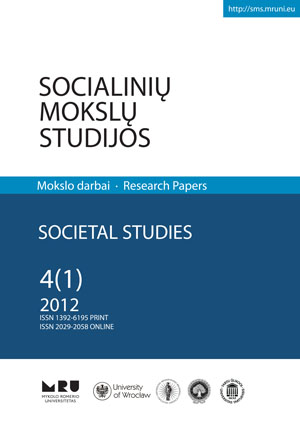Byla Paksas prieš Lietuvą arba mėginimas įveikti Konstitucinio Teismo nutarimą
The Case Paksas v. Lithuania or an Attempt to Overcome a Ruling of the Constitutional Court
Author(s): Vytautas SinkevičiusSubject(s): Social Sciences
Published by: Mykolas Romeris University
Keywords: the Constitution; the Constitutional Court; the constitutional doctrine; the relation between the Constitution and the Convention for the Protection of Human Rights and Fundamental Freedoms
Summary/Abstract: On 6 April 2004, the Seimas removed R. Paksas from the office of the President of the Republic under procedure for impeachment proceedings for gross violation of the Constitution. In its ruling of 25 May 2004, the Constitutional Court held that “the removal of the President of the Republic from office, as well as of any other person indicated in Article 74 of the Constitution, who has breached the oath and grossly violated the Constitution, according to the procedure for impeachment proceedings, is not an end in itself” and that “the purpose of the constitutional institute of impeachment is <…> much broader: its purpose is to prevent the persons who have grossly violated the Constitution and breached the oath from holding the office provided for in the Constitution, the beginning of which, according to the Constitution, is linked with taking the oath specified in the Constitution”. Thus, the Constitutional Court held that, under the Constitution, a person, who grossly violated the Constitution, beached the oath, committed a crime by which also grossly violated the Constitution and breached the oath, and, due to this, was removed from office according to the procedure for impeachment proceedings, may never stand in elections of the President of the Republic or a Member of the Seimas, may never hold the office of a justice of the Constitutional Court, a justice of the Supreme Court, a judge of the Court of Appeal, a judge at other court, a member of the Government, or the State Controller, since the beginning of holding such an office is linked with taking the oath set forth in the Constitution. On 27 September 2004, R. Paksas applied to the European Court of Human Rights (hereinafter also referred to as the ECHR), asserting that Lithuania had violated his right to stand in elections of the President of the Republic or a Member of the Seimas. On 6 January 2011, the ECHR delivered a judgment in which it held that the prohibition for R. Paksas to stand in election to the parliament for any time in the future was disproportionate and that by establishing the said prohibition Lithuania had violated Article 3 of Protocol No. 1 of the Convention for the Protection of Human Rights and Fundamental Freedoms. Lawyers have presented completely different opinions on how to implement this judgment of the ECHR: some of them maintain that there is no need to change the Constitution and that what needs to be done is only changing the Law on Elections to the Seimas and establishing a certain period therein, and, after this period is over, the person removed from office under procedure for impeachment proceedings would be able to stand in elections to the Seimas again, or not establishing any period in the law and not limiting the right of the person to stand in elections to the Seimas; other lawyers hold an opposite view: they assert that it is necessary to amend the Constitution, and as long as it is not amended, it is not allowed t
Journal: Socialinių mokslų studijos
- Issue Year: 4/2012
- Issue No: 1
- Page Range: 193-213
- Page Count: 21
- Language: Lithuanian

